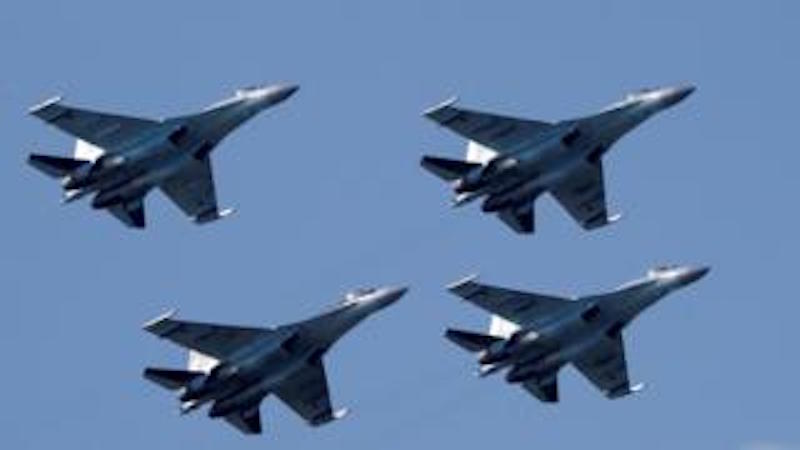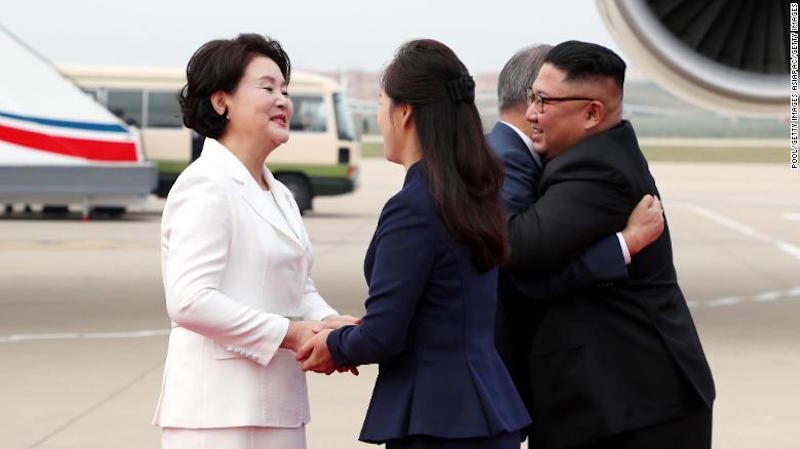
 China Will Not Purposefully Devalue the Yuan, Premier Li Keqiang Says
China Will Not Purposefully Devalue the Yuan, Premier Li Keqiang Says"China will by no means stimulate exports by devaluing the yuan," Chinese Premier Li Keqiang said in a speech at the World Economic Forum in Tianjin, China on Wednesday, after months of speculation over whether the Chinese government intended to offset the effects of U.S. tariffs on Chinese imports by "competitive devaluation" of the exchange rate. Since April of this year, the renminbi has lost around 9 percent of its value against the dollar. "Recent fluctuations in the renminbi exchange rate have been seen as an intentional measure, but that isn't true," Premier Li said. "One-way devaluation will do more harm than good to China's economy."
As Reuters reports, in recent months, China's central bank has been intervening to stabilise the currency, including by reintroducing a "counter-cyclical factor" in daily yuan fixing to counter the bias toward a weaker yuan. Writing last week, Deborah Elms of the Asian Trade Centre in Singapore discussed why she believes China won't devalue its currency in an article for China-US Focus. "The fall of the currency can also be seen as a natural byproduct of the escalating trade war. . .In response, it appears that the Chinese government is now trying to stabilize the situation, rather than allow the currency to continue to depreciate," she argued.
Premier Li's comments came two days after President Donald Trump placed additional tariffs of 10 percent on roughly $200 billion of imports from China, which will take effect next Monday. In a White House statement announcing the new tariffs, President Trump said, "We have been very clear about the type of changes that need to be made, and we have given China every opportunity to treat us more fairly. But, so far, China has been unwilling to change its practices." In response, China's Finance Ministry announced that it had "no choice" but to levy tariffs on about $60 billion worth of U.S. imports — leaving international spectators speculating whether the U.S. president will follow through on his threat to place tariffs on roughly all U.S. imports of Chinese goods.
 U.S Sanctions China for Russian Weapons Purchase
U.S Sanctions China for Russian Weapons PurchaseThe U.S. State Department announced Thursday that it would impose sanctions against the Chinese military for its purchase of Russian military equipment. In the official statement, American diplomatic officials noted, "Today's actions are not intended to undermine the military capabilities or combat readiness of any country but rather to impose costs on Russia in response to its interference in the United States election process, its unacceptable behavior in eastern Ukraine, and other malign activities."
According to Reuters, the sanctions were imposed on China's Equipment Development Department (EDD) for its purchase of 10 SU-35 combat aircraft in 2017 and S-400 surface-to-air missile system-related equipment in 2018, which the State Department said violated U.S. sanctions on Russia. This move also blocks the EDD, and its director Li Shangfu, from doing business with any U.S. entities. The penalties were applied under the 2017 Countering America's Adversaries Through Sanctions Act, passed by the American legislature to punish Russia's continued involvement in conflicts in both Ukraine and Syria. In addition to the impositions against the Chinese military, 33 Russians were added to the act's blacklist, expanding the total to 72 individuals personally sanctioned for undertaking transactions with Russian intelligence and military services.
On Friday, China's Foreign Ministry Spokesman Geng Shuang protested the sanctions, saying, "The U.S. has seriously violated the basic norms of international relations and disturbed the relationship between China and the U.S. We strongly call on the U.S. to remedy the mistake and cancel the sanctions. Otherwise, the U.S. has to bear the consequences." China will continue its defense cooperation with Russia as well as the development of strategic ties with the Eurasian power, he said.
 Third Inter-Korean Summit Focused on Denuclearization
Third Inter-Korean Summit Focused on DenuclearizationThe third inter-Korean summit took place this week. South Korean President Moon Jae-in arrived in North Korea on Tuesday, the first visit by a South Korean leader to the North Korean capital in 11 years. North Korean leader Kim Jong Un and President Moon greeted each other with smiles and a hug, as crowds of North Koreans waved flowers and national and unification flags. The focus of the summit was denuclearization, easing the military standoff, and improving ties between the North and South.
According to the The Wall Street Journal, on Wednesday, Kim and Moon concluded a private meeting with a news conference during which "they reaffirmed their goal of ridding the Korean Peninsula of nuclear weapons." Kim will allow inspectors and experts to oversee the dismantling of North Korea's Sohae satellite launching facility and will also permanently deactivate its Yongbyon nuclear-enrichment facility.
But, there's a catch. Both Kim and Moon are looking to the United States to take reciprocal action, as Kim will not deactivate North Korea's nuclear-enrichment facility unless certain conditions are met. One such condition is that the United States agrees to certain concessions, which were not explicitly mentioned. So far, President Trump has reacted minimally, but positively. He told reporters at the White House on Wednesday that there was "very good news from North Korea, South Korea." He is expected to meet with President Moon on Monday during the annual United Nations General Assembly; if Moon can prove that there was real progress, then Trump may be persuaded to arrange a second meeting with Kim.
 The Fallout of the U.S. China Trade War: New Video
The Fallout of the U.S. China Trade War: New VideoWith the trade war intensifying, American leaders and businesses are raising concerns and discussing possible solutions to this ongoing struggle. "The American strategy should be to pick the U.S. up, not to hold China down," says former U.S. Treasury Secretary Larry Summers, who believes the U.S. should invest in infrastructure, boost commitments to basic science education and develop the education system in order to support employment growth in the U.S.
In bold letters at the top of the U.S. Chamber of Commerce's website are the words, "Trade works. Tariffs Don't." The chamber predicts that these tariffs will cause "extremely significant damage" to conservative-leaning states, including Idaho, South Dakota, Alaska, Louisiana, Alabama and South Carolina, and American businesses like Harley-Davidson and General Electric. In our latest video, China-US Focus explores what American business leaders and experts, including International Monetary Fund director Christine Lagarde, think about the trade war and the impact of the tariffs on businesses. Watch the full video here.
Prepared by China-US Focus editorial teams in Hong Kong and New York, this weekly newsletter offers you snap shots of latest trends and developments emerging from China every week, while adding a dose of historical perspective.
- 2018-09-14 China and the U.S. Discussing New Trade Talks, As Pressure Over Trade Policy Grows
- 2018-09-07 Forum on China-Africa Cooperation Yields New Pledges
- 2018-08-31 BRI’s Fifth Anniversary Comes Amidst Debate Over Sustainability
- 2018-08-24 Trade Talks Continue in DC as New Tariffs Hit
- 2018-08-17 Trade Talks Back On
- 2018-08-10 American Natural Gas Industry Braces for New Chinese Tariffs
- 2018-08-03 Tentative Signs of U.S.-China Cooperation at the ASEAN Summit
- 2018-07-27 President Trump’s Trade War Bailout
- 2018-07-20 Xi Charms the World
- 2018-07-13 China Defends WTO Record in the Face of Additional U.S. Tariffs
- 2018-07-06 The Trade War Begins
- 2018-06-29 President Trump Chooses Slightly Softer Option on Chinese Investment
- 2018-06-22 Trade Tensions Spark Stock Sell-Off in China
- 2018-06-14 How “Comprehensive” Is the Kim-Trump Agreement?
- 2018-06-08 China Awards Putin First Medal of Friendship
- 2018-06-01 USPACOM Rebranded As U.S. Indo-Pacific Command
- 2018-05-25 Trump Cancels North Korea Meeting
- 2018-05-18 The On/Off Trump-Kim Summit
- 2018-05-11 American Goods Are Stuck at Chinese Ports
- 2018-05-04 China and the U.S. Lay Trade Demands on the Table
